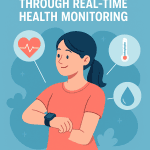This article is for informational purposes only and should not be considered medical advice. Always consult a healthcare professional for medical concerns.
The Importance of Sleep
Sleep is not just a time for rest; it is a critical component of our overall health. For many, the significance of a good night’s sleep is often underestimated. Did you know that sleep plays a vital role in regulating our mood, cognitive function, and even our physical health? According to the National Sleep Foundation, adults should aim for 7-9 hours of sleep per night to maintain optimal health. But what happens when we don’t get enough sleep? The consequences can be profound.
The Connection Between Sleep and Mental Health
Research has consistently shown a strong link between sleep and mental health. Poor sleep quality can exacerbate symptoms of anxiety and depression, while good sleep can enhance emotional resilience. For instance, a study published in PubMed found that individuals with insomnia were significantly more likely to develop depression compared to those who slept well. This relationship is not merely correlational; it is deeply rooted in the pathophysiology of the brain.
How Sleep Affects Mood
When we sleep, our brains undergo various processes that help regulate mood. During sleep, the brain consolidates memories and processes emotions. Lack of sleep can lead to irritability and heightened emotional responses. Have you ever noticed how a sleepless night can make you feel more anxious or stressed? This is not just in your head; it’s a physiological response. Sleep deprivation affects neurotransmitters like serotonin and dopamine, which are crucial for mood regulation. Furthermore, chronic sleep deprivation can lead to alterations in brain structure and function, particularly in areas related to emotional regulation, such as the amygdala and prefrontal cortex.
Sleep Disorders and Their Impact
Sleep disorders such as insomnia, sleep apnea, and restless leg syndrome can significantly impact mental health. Insomnia, for example, is characterized by difficulty falling or staying asleep, which can lead to chronic fatigue and increased anxiety. The CDC reports that about 35% of adults do not get enough sleep, which can lead to serious health issues. But what are the underlying mechanisms at play?
Sleep Apnea and Mental Health
Sleep apnea, a condition where breathing repeatedly stops and starts during sleep, is also linked to mental health issues. Individuals with sleep apnea often experience excessive daytime sleepiness, which can lead to difficulties in concentration and increased risk of depression. A study in the Journal of Clinical Sleep Medicine found that treating sleep apnea improved mood and quality of life for many patients. The repeated interruptions in breathing lead to hypoxia (low oxygen levels), which can affect brain function and mood stability. This cyclical relationship means that poor sleep can worsen mental health, which in turn can exacerbate sleep problems, creating a challenging feedback loop.
The Role of Sleep in Chronic Disease Management
Sleep is not only crucial for mental health but also plays a significant role in managing chronic diseases. Conditions such as diabetes, heart disease, and obesity are all influenced by sleep quality. For instance, individuals with diabetes often report sleep disturbances, which can lead to poor blood sugar control. But how does sleep interact with these chronic conditions?
Diabetes and Sleep
Research indicates that poor sleep can lead to insulin resistance, a key factor in the development of type 2 diabetes. A study published in Diabetes Care found that individuals who slept less than 6 hours per night had a higher risk of developing diabetes compared to those who slept 7 hours or more. The mechanisms involve hormonal imbalances, including increased cortisol levels, which can lead to elevated blood sugar levels. Additionally, sleep deprivation can disrupt the secretion of insulin, further complicating diabetes management.
Heart Disease and Sleep
Sleep deprivation is also linked to cardiovascular health. According to the American Heart Association, insufficient sleep can lead to high blood pressure, obesity, and increased cholesterol levels, all of which are risk factors for heart disease. Prioritizing sleep can be a simple yet effective strategy for improving heart health. The inflammatory processes triggered by lack of sleep can contribute to arterial damage, increasing the risk of heart attacks. Furthermore, sleep deprivation can lead to increased sympathetic nervous system activity, which can elevate heart rate and blood pressure, further straining cardiovascular health.
Improving Sleep Quality
Given the profound impact of sleep on mental health and chronic disease management, it is essential to prioritize sleep hygiene. Here are some practical tips to improve sleep quality:
- Establish a Regular Sleep Schedule: Go to bed and wake up at the same time every day, even on weekends. This helps regulate your body’s internal clock.
- Create a Relaxing Bedtime Routine: Engage in calming activities before bed, such as reading or meditating. This signals to your body that it’s time to wind down.
- Limit Screen Time: Reduce exposure to screens at least an hour before bedtime to promote better sleep. The blue light emitted by screens can interfere with melatonin production.
- Optimize Your Sleep Environment: Ensure your bedroom is dark, quiet, and cool to enhance sleep quality. Consider blackout curtains and white noise machines if necessary.
- Be Mindful of Food and Drink: Avoid large meals, caffeine, and alcohol close to bedtime. These can disrupt your sleep cycle and lead to poor sleep quality.
- Exercise Regularly: Engaging in physical activity during the day can help you fall asleep faster and enjoy deeper sleep. However, avoid vigorous exercise close to bedtime.
- Manage Stress: Incorporate stress-reducing techniques into your daily routine, such as yoga, deep breathing exercises, or journaling.
When to Seek Help
If you continue to experience sleep difficulties despite making lifestyle changes, it may be time to seek professional help. Sleep disorders can often be treated effectively with the right interventions. A sleep specialist can help diagnose any underlying conditions and recommend appropriate treatments. But what should you expect during a consultation?
Therapies and Treatments
There are various therapies available for sleep disorders, including cognitive behavioral therapy for insomnia (CBT-I), which has been shown to be effective in improving sleep quality. Additionally, continuous positive airway pressure (CPAP) therapy is a common treatment for sleep apnea that can significantly improve sleep quality and overall health. These treatments address the root causes of sleep disturbances rather than just the symptoms. In some cases, medications may also be prescribed, but these should be viewed as a temporary solution rather than a long-term fix.
Case Vignette
Consider the case of Sarah, a 32-year-old woman who struggled with insomnia for several months. She found herself tossing and turning at night, often feeling anxious about her inability to fall asleep. This lack of sleep not only affected her mood but also her productivity at work. After consulting a sleep specialist, she underwent CBT-I and learned techniques to manage her anxiety and improve her sleep hygiene. Within weeks, Sarah noticed a significant improvement in her sleep quality and overall well-being. Her story highlights the importance of seeking help when sleep issues persist and illustrates how effective treatment can lead to transformative changes in daily life.
Myth-Busters
- Myth: You can catch up on sleep during the weekends.
Fact: While sleeping in may help alleviate some sleep debt, it does not fully compensate for the negative effects of chronic sleep deprivation. Consistent sleep patterns are crucial for health. - Myth: Alcohol helps you sleep better.
Fact: Although alcohol may initially make you feel drowsy, it disrupts the sleep cycle and can lead to poor sleep quality. It often results in more awakenings during the night. - Myth: Older adults need less sleep.
Fact: While sleep patterns may change with age, older adults still require 7-8 hours of sleep for optimal health. Quality of sleep can be just as important as quantity. - Myth: Napping is a sign of laziness.
Fact: Napping can be beneficial for some individuals, especially if they are sleep deprived. Short naps can enhance alertness and performance.
Conclusion
In conclusion, sleep is a fundamental aspect of our health that influences both mental well-being and the management of chronic diseases. By understanding the importance of sleep and taking steps to improve sleep quality, we can enhance our overall health and quality of life. Remember, a good night’s sleep is not just a luxury; it is a necessity for optimal health. Prioritizing sleep is an investment in your future well-being. As you embark on this journey towards better sleep, consider what changes you can make today for a healthier tomorrow.
Key Takeaways
- Sleep is essential for mental health and chronic disease management.
- Poor sleep can exacerbate anxiety, depression, and chronic conditions.
- Establishing a regular sleep schedule can improve sleep quality.
- Sleep disorders like insomnia and sleep apnea require professional treatment.
- Improving sleep hygiene can lead to better overall health.
References
- National Sleep Foundation
- Centers for Disease Control and Prevention (CDC)
- Journal of Clinical Sleep Medicine
- Diabetes Care
- American Heart Association
- PubMed
- World Health Organization (WHO)
- UpToDate








Post a comment